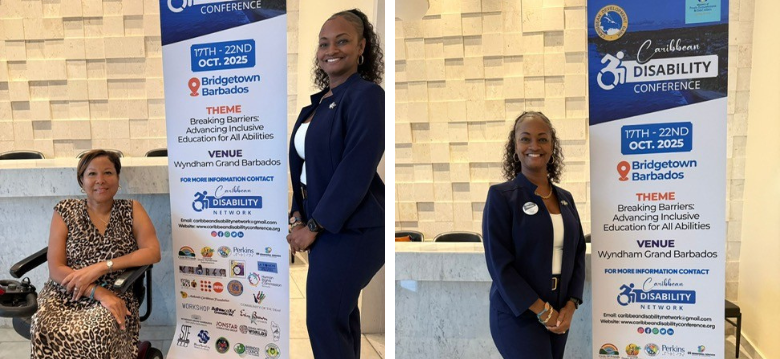Minister of Education Participates in Regional Conference

The Minister of Education, Senator the Hon. Crystal Caesar, JP, recently delivered remarks at the Caribbean Disability Network’s (CDN) second annual Caribbean Disability Conference, held in Bridgetown, Barbados, under the theme “Breaking Barriers: Advancing Inclusive Education for All Abilities.”
This year's conference focused on inclusive education. The goal of the conference underscored UNESCO's definition for inclusive education as the "process of addressing and responding to the diversity of needs of all children, youth and adults through increasing participation in learning, cultures and communities, and reducing and eliminating exclusion within and from education. It involves changes and modifications in content, approaches, structures and strategies, with a common vision that covers all children of the appropriate age range and a conviction that it is the responsibility of the regular system to educate all children".
A diverse group of stakeholders, including the Executive Officer for the Human Rights Commission of Bermuda, Mrs Lisa Reed, attended the conference. This group included government officials, educators, representatives from organisations serving people with disabilities, researchers, students, families, non-governmental organisations, funding agencies, and frontline service providers. Their collective presence underscored the broad support for the cause of inclusive education in the Caribbean.
The organisers, CDN, invited Minister Caesar to deliver remarks on the final plenary session. The Minister was asked to reflect on the conference. She not only reflected but also reaffirmed her commitment to the cause. She emphasised that the conference was more than a space for discussion; the gathering served as a catalyst for transformation, regional support, and collaboration.
In her remarks, Minister Caesar stated, "We have heard powerful stories, engaged in thoughtful dialogue, and challenged ourselves to rethink how, as a society, we can create a world where every person, regardless of ability, can live with dignity, independence, and opportunity. Today, we must reaffirm that inclusion is not an act of charity. It is a matter of rights, of respect, and of shared humanity. Our schools are a crucial part of this vision. They must be safe spaces, free from bullying and teasing, where every learner feels respected and supported.
“Teachers play a vital role in shaping this environment. They must model inclusive behaviour, promote empathy, and be trained to meet diverse learning needs. This includes the ability to differentiate instruction, to integrate assistive technologies, and to identify students who may require interventions or support to access the curriculum equitably.
“As a government, our commitment is to a future where social exclusion is replaced by belonging, where services are dignified and accessible, and where every person has the opportunity to fulfil their potential. True inclusion must be normalised, not exceptional, but woven into the fabric of everyday life. When inclusion becomes the norm, communities grow more empathetic, workplaces become more diverse, and societies become more just. Normalising inclusion fosters sensitisation of the community at large, helping society to value difference as a source of strength rather than division."
As the Minister concluded, her words echoed the essence of the conference. "Inclusion is not a one-size-fits-all concept; it is about equity, flexibility, and compassion. These principles should guide our actions and decisions in the context of inclusion."
By its close, CDN and partners adopted a Caribbean Declaration on Inclusive Education and a regional action plan designed to drive implementation across the region, ensuring that no learner is left behind and promoting best practices and inclusive education frameworks.